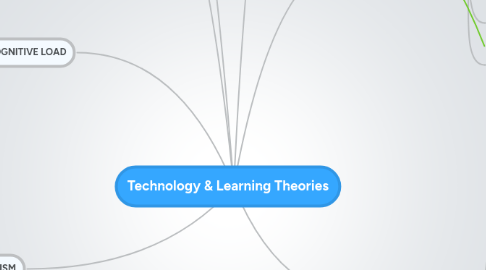Technology & Learning Theories
da Emily Schroeder


1. CONNECTIVISM
1.1. * knowledge is created
1.2. *decision making
1.3. *main goal is to have up-to-date information
1.4. * variety of skills needed in order to learn in 21st Century
1.5. * learning occurs through creating and maintaining connections
1.6. * " learning and knowledge rests in diversity of options" (Siemens,2004)
1.7. * purpose of teacher is to steer students towards creating their own knowledge
2. CONSTRUCTIVISM ( Hoover,1996)
2.1. * learning is constructed - new knowledge builds on old knowledge
2.2. * learners can modify knowledge based on current understandings
2.3. * authentic learning: learners assume responsibility of their own learning
2.4. * collaboration
2.5. * students encouraged to ask questions
2.6. *peer collaboration useful tool
2.7. * student- centered - role of teacher is to assist in learning process
3. COGNITIVE LOAD
3.1. * Long term memory works with Working memory
3.2. * working memory creates schemas, which are stored in long term memory
3.3. * learning negatively affected if working memory is overloaded
3.4. * " information chunking and repetition" (McCandless, 2010)
3.5. * visuals allow for more natural information processing
3.6. * provide background knowledge for multifaceted ideas
4. BEHAVIOURISM
4.1. * environment influences behaviour and learning
4.2. *positive reinforcement, negative reinforcement, punishments
4.3. * "actions(behaviours) sites of knowing,teaching and learning" (Spillane,2002,p.380)
4.4. * students with cognitive disabilites typically need this type of instruction
4.5. * teacher is focus
4.6. *demonstrating the task and task analysis
5. SCOT
5.1. *social construction of technology
5.2. * people influence technology
5.3. *society decides whether technology fails or succeeds
5.4. * method of analyzing technology
5.5. * principle of symmetry
5.6. * different ways of using and constructing technology
5.7. * problems can arise from technology
6. MEDIA ECOLOGY
6.1. * multiple definitions
6.2. * "study of media as environments" (Postman,1970)
6.3. * technology has strong influence on many aspects of life
6.4. * teachers need to be aware of how media tools influence teaching and learning
6.5. * use media to support, extend, enhance, and guide learning
7. PHILOSOPHIES
7.1. TPACK
7.1.1. * 3 main areas of knowledge
7.1.1.1. content
7.1.1.2. pedagogical
7.1.1.3. technological
7.1.2. * context is different for different areas of work - ex: elementary vs. secondary school
7.1.3. * sub-domains
7.1.3.1. content + pedagogical
7.1.3.2. content + technological
7.1.3.3. pedagogical + technological
7.1.4. * sub-domains all intersect to create TPACK
7.2. Philosophy of Technology
7.2.1. personal statement
7.2.2. display it along with your Philosophy of Teaching
7.2.3. the 'how you can/want to use technology in the classroom' statement
7.2.4. 'critical literacy'
